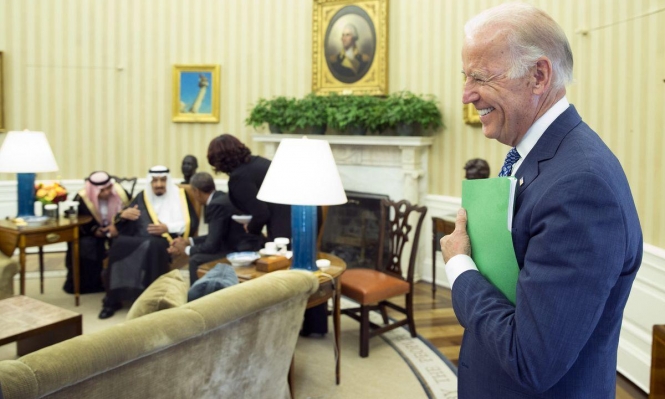American Institute: Biden is not required to forgo our concern for human rights to engage the Saudis.

In his op-ed for the Hill, Dennis Ross said that Presidents of the United States struggle to strike a balance between interests and principles in our foreign policy. We have long advocated internationally for democratic values and the preservation of human rights. Nonetheless, we have maintained for a long time close ties with regimes that have violated human rights and are not democracies. Our leaders must make decisions and establish priorities, and these decisions frequently appear to prioritise interests above ideals.
No one would dispute that Jimmy Carter centred his foreign policy on human rights. Nonetheless, he maintained strong backing for a number of nations, notably Egypt and Saudi Arabia, whose human rights records were hardly exceptional. Peace with Israel was undoubtedly his first objective with Egypt. With the Saudis, it was oil, especially given the 1973 oil embargo, his dread of another one, and the gas lines that arose alongside the Iran-Iraq conflict in 1980.
President Biden intends to visit Saudi Arabia on his next trip to the Middle East next month. His visit has been criticised. His detractors believe he is giving the Saudis a break and rehabilitating Mohammed bin Salman, Saudi Arabia’s crown prince, without holding him accountable for the brutal murder of writer Jamal Khashoggi. The homicide was horrifying. President Trump should not have disregarded it in such a manner; he might have imposed a price without damaging relations.
Those who attack President Biden for his planned visit, however, act as if there are no other factors to consider. There exist.
The invasion of Ukraine by Russia is an international earthquake. To impose an unambiguous cost on Russia, we must do everything possible to deny it the oil revenues that help finance its war effort — a war that Vladimir Putin conducts as though he can win by attrition and outlasting Ukraine. However, removing as much Russian oil from the market as possible raises prices and necessitates an increase in oil output to compensate for the loss. Saudi Arabia is the only country in the world with considerable spare oil production capability.
Russia’s conflict serves as a reminder that there is no such thing as oil independence so long as there is a single global oil/energy market, and its interruption results in significantly higher oil prices for everyone. Five bucks per gallon is evidence of this. Yes, true independence will be achieved when renewables replace fossil fuels, but that day is still decades away, with the peak of oil usage likely not occurring for another 10 to 15 years. Just as Jimmy Carter realised the significance of Saudi Arabia to the United States, so must we today.
There are other oil-producing nations, such as Iran and Venezuela, whose oil might be added to the market if sanctions on them were eased. Iran and Venezuela are sanctioned for valid reasons, including their support for terrorism and the risks they represent to their respective regional orders, just as we do not wish to fund Russia’s aggressiveness with its oil profits. Saudi Arabia is not a revisionist state that seeks to overturn regional and global orders. Iran and Venezuela are both. (In the case of Iran, which is progressively undermining the IAEA’s capacity to supervise its nuclear programme, adding two new cascades of sophisticated centrifuges, enriching to near weapons grade, and shortening its break-out time, now is not the time to allow their oil to return to the market.)
Because we are now engaged in a longer-term fight with Russia and China, we must expand our coalition of cooperating governments. Yes, we begin with the other democracies, but we also need non-revisionist powers, such as Saudi Arabia, to join the alliance. Their resources matter and alienating them is not wise, especially given what is at stake in this competition — whether we can preserve a rules-based system or Russia (with China’s tacit support) succeeds in redefining the international landscape so: borders are not inviolable and force is legitimate to change them; bigger nations can impose on smaller nations and have a right to a sphere of influence in which they dictate both the internal and external policies of the spherical nations they dominate; and smaller nations have
Preventing these from serving as the foundation for a new international (dis)order is both an interest and a value. In a similar manner, when President Biden discusses his trip to Saudi Arabia, he refers to advancing peace. Clearly, he desires to facilitate a process of normalisation between Saudi Arabia and Israel. In meetings I just had in the Kingdom, it was abundantly evident that Saudis saw relations with Israel as inevitable, not just because to their shared worries about Iran, but also because the Saudis desire to establish a robust, knowledge-based economy and view Israel as a natural partner. Those who wish to construct a more optimistic Middle East would benefit from this relationship. (It might also be part of a plan to break the impasse between Israelis and Palestinians, since for every public step the Saudis take toward the Israelis, they could request that the Israelis take a step toward the Palestinians.)
The Saudis should be aware of what may elicit public reactions from us. We should create limits and a “no surprises” agreement in the partnership. Due to contemporary international issues, we have a stake in Saudi Arabia, one that involves both our interests and our ideals.





